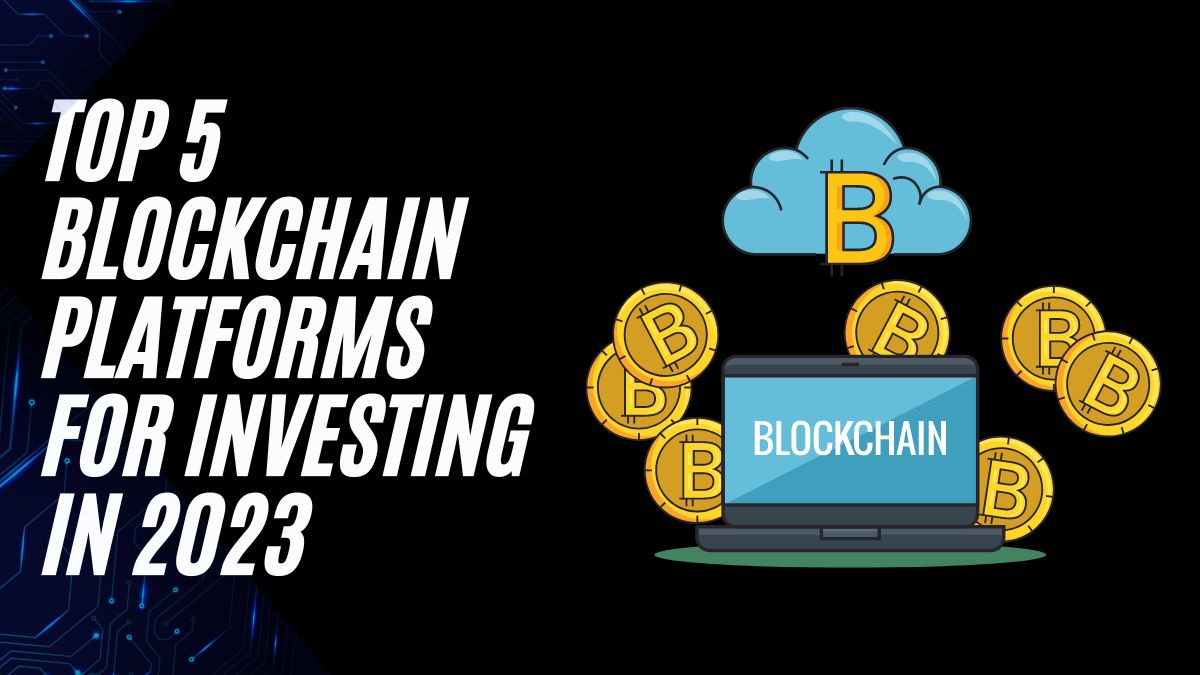Top 5 Blockchain Platforms for Investing in 2023

Within the continually shifting landscape of investment prospects, blockchain technology has emerged as a transformative power, revolutionizing various sectors and reshaping financial transactions. The fundamental technology underlying cryptocurrencies, blockchain, provides a secure and decentralized method for recording and validating transactions. As we enter 2023, the allure of investing in blockchain has never been stronger.
In this article, we'll delve into the five leading blockchain platforms that hold the promise of offering lucrative investment opportunities this year.
1. Ethereum (ETH): Innovating with Smart Contracts
Ethereum maintains its front-runner position through its pioneering introduction of smart contracts. These self-executing agreements enable automated and trustworthy transactions, eliminating intermediaries and reducing the risk of fraudulent activities.
Ethereum boasts a robust ecosystem that supports a diverse spectrum of decentralized applications (DApps) spanning various domains, from decentralized finance (DeFi) to non-fungible tokens (NFTs). The upcoming Ethereum 2.0 upgrade aims to enhance scalability and energy efficiency, further solidifying its credentials as a platform worthy of investment.
Key Features of Ethereum:
-
Smart Contracts: Ethereum was the pioneer in introducing smart contracts, enabling secure and automated transactions.
-
Diverse DApp Ecosystem: Ethereum hosts a wide array of DApps, ranging from DeFi to NFTs, contributing to its versatility.
-
Decentralization: The decentralized nature of Ethereum ensures security and resilience against potential failures.
-
Interoperability: Ethereum's compatibility with other blockchains bolsters its utility and connectivity.
-
Ethereum 2.0 Upgrade: The upcoming upgrade promises improved scalability and energy efficiency.
2. Binance Smart Chain (BNB): Balancing Affordability and Functionality
Binance Smart Chain (BNB) has garnered attention for its ability to balance affordability and functionality. The platform's economical transaction fees make it an appealing choice for users seeking cost-effective transactions and interactions with DApps.
Additionally, Binance Smart Chain's compatibility with the Ethereum Virtual Machine (EVM) enables developers to migrate existing Ethereum DApps seamlessly. This compatibility expands the platform's potential use cases, rendering it a captivating investment prospect.
Key Features of Binance Smart Chain:
-
Low Transaction Fees: Binance Smart Chain's budget-friendly transactions enhance user accessibility and experience.
-
EVM Compatibility: Seamless migration of Ethereum DApps is facilitated by its compatibility with the Ethereum Virtual Machine.
-
Swift Confirmation Times: The platform's rapid confirmation times expedite transaction processing.
-
Focus on Decentralized Finance (DeFi): Binance Smart Chain's emphasis on DeFi applications attracts users and developers alike.
-
Integration with Binance Ecosystem: The platform's integration with the broader Binance ecosystem opens doors for additional growth opportunities.
3. Cardano (ADA): Embracing Sustainability and Scalability
Cardano sets itself apart by placing sustainability and scalability at the forefront. The platform adopts a research-oriented approach, leveraging peer-reviewed academic research to steer its development. Cardano's tiered architecture segregates ledger and computation functions, bolstering security and adaptability.
With the integration of the Alonzo upgrade, Cardano now supports smart contracts, empowering developers to create a diverse range of applications. This strategic move positions Cardano as a platform poised for significant growth.
Key Features of Cardano:
-
Research-Driven Development: Cardano's development is informed by rigorous peer-reviewed academic research.
-
Layered Architecture: Segregating ledger and computation functions enhances security and flexibility.
-
Emphasis on Sustainability: Cardano's focus on environmental sustainability resonates with growing investor concerns.
-
Alonzo Upgrade: The upgrade introduces smart contract capabilities, broadening Cardano's potential use cases.
-
Scalability: Cardano's emphasis on scalability prepares it for accommodating increased transaction volumes.
4. Solana (SOL): Enabling High-Performance DApps
Solana distinguishes itself with its unique consensus mechanism, Proof-of-History (PoH), coupled with Proof-of-Stake (PoS), which equips it to power high-performance decentralized applications.
The platform's impressive throughput and swift confirmation times open doors for applications demanding real-time responsiveness, including decentralized exchanges and high-frequency trading platforms. Solana's architecture and speed make it a compelling choice for developers and investors interested in emerging use cases requiring rapid transaction processing.
Key Features of Solana:
-
Proof-of-History (PoH): Solana's PoH bolsters scalability and accelerates transaction confirmation.
-
High Throughput: The platform's high throughput facilitates thesimultaneous processing of numerous transactions.
-
Low Latency: Solana's low latency supports real-time applications and minimizes delays.
-
DeFi and NFT Support: Solana's capabilities cater to the needs of the flourishing DeFi and NFT sectors.
-
Growing Ecosystem: The expanding collection of DApps on Solana contributes to its increasing popularity.
5. Polkadot (DOT): Focusing on Interoperability and Parachain Ecosystem
Polkadot stands out with its emphasis on interoperability. The platform facilitates seamless communication and data sharing among various blockchains through its innovative design. Polkadot introduces parachains, specialized blockchains tailored for specific use cases.
These parachains can connect with the primary Polkadot network, enabling cross-chain transfers and collaborations. This distinctive approach to interoperability positions Polkadot as a hub for diverse blockchain projects and applications.
Key Features of Polkadot:
-
Interoperability: Polkadot's design centers around enabling effective communication and collaboration between blockchains.
-
Parachain Concept: Introducing parachains brings about tailored and specialized blockchain functionalities.
-
Cross-Chain Transfers: Polkadot allows smooth transfer of assets and data between different blockchains.
-
Scalability: The platform's architecture supports scalability by distributing transactions across multiple chains.
-
Evolving Ecosystem: Polkadot's evolving interconnected parachain ecosystem fuels innovation and diversity.
Conclusion:
In conclusion, the landscape of blockchain development company platforms for investment in 2023 presents an array of enticing possibilities. Ethereum's smart contracts, Binance Smart Chain's affordability, Cardano's research-oriented approach, Solana's high-performance capabilities, and Polkadot's interoperability stand as defining features of these platforms.
Investors aiming to capitalize on the potential of blockchain technology should thoughtfully evaluate these features, analyze adoption rates, and assess growth trajectories. Through informed investment decisions and strategic diversification across these leading blockchain platforms, investors position themselves for success in the dynamic realm of blockchain investments.
In case you have found a mistake in the text, please send a message to the author by selecting the mistake and pressing Ctrl-Enter.
You must be logged in to comment.
Sign In /
Sign Up


No comments yet